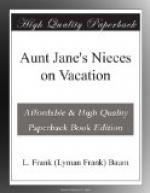But the boy would not be conciliated.
“I’ll send it to Munsey’s, thet’s what I’ll do; an’ then you’ll be durn sorry,” he said, almost ready to cry.
“Do,” urged Louise sweetly. “And if they print it, Mr. Clark, I’ll agree to purchase your next story for fifty dollars.”
“All right; the fifty’s mine. I got witnesses, mind ye!” and he flounced out of the room like an angry schoolboy.
“Oh, Louise,” exclaimed Patsy, reproachfully, “why didn’t you let me see the thing? It would have been better than a circus.”
“Poor boy!” said the literary editor, with a sigh. “I didn’t want to humiliate him more than I could help. I wonder if he really will have the audacity to send it to Munsey’s?”
And now the door opened to admit Peggy McNutt, who had been watching his chance to stump across to the printing office as soon as Skim left there. For Peggy had reasoned, not unjustly, that if Skim Clark could make a fortune as an author he, Marshall McMahon McNutt, had a show to corral a few dollars in literature himself. After lying awake half the night thinking it over, he arose this morning with the firm intention of competing with Skim for the village laurels. He well knew he could not write a shuddery detective story, such as Skim had outlined, but that early poem of his, which the boy had seemed to regard so disdainfully, was considered by Peggy a rather clever production. He repeated it over and over to himself, dwelling joyously on its perfect rhyme, until he was convinced it was a good poem and that Skim had enviously slandered it. So he wrote it out in big letters on a sheet of foolscap and determined to offer it to “them newspaper gals.”
“I got a pome, Miss Patsy,” he said, with unusual diffidence, for he was by no means sure the “gals” would not agree with Skim’s criticism.
“What! Another contributor?” she exclaimed playfully. “Has the whole town suddenly turned literary, Peggy?”
“No; jest me ‘n’ Skim. Skim says my pome’s no good; but I sort o’ like it, myself.”
“Let me see it,” said Patsy, ignoring this time the literary editor, who was glad to be relieved of the responsibility of disappointing another budding author.
Peggy handed over the foolscap, and Patsy eagerly read the “pome.”
“Listen, Louise! Listen, Beth!” she called, delightedly. “Here is certainly a real ‘pome,’ and on aviation—the latest fad:
“’SKY
HIGH
BY
MARSHALL MCMAHON MCNUTT
of
Millville
dealer in Real Estate Spring Chickens
&c.
1.
I
sigh
Too
fly
Up
high
In
the sky.
2.
But my
Wings air shy
And so I cry
A sad goodby
Too fly-
Ing.’”
A chorus of hilarious laughter followed the reading, and then Patsy wiped her eyes and exclaimed:




